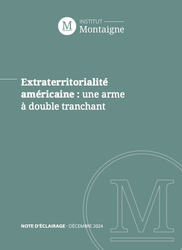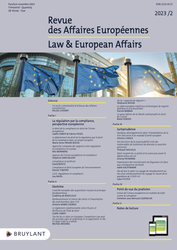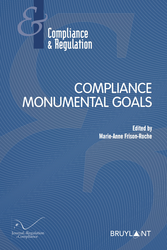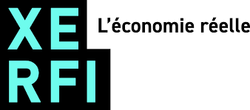Thesaurus : Doctrine

► Full Reference: R. Sève, "L'Obligation de Compliance et les mutations de la souveraineté et de la citoyenneté" ("Compliance Obligation and changes in Sovereignty and Citizenship"), in M.-A. Frison-Roche (ed.), L'obligation de Compliance, Journal of Regulation & Compliance (JoRC) and Dalloz, coll. "Régulations & Compliance", 2024, forthcoming.
____
📕read the general presentation of the book, L'obligation de Compliance, in which this article is published.
____
► English Summary of this article (done by the Journal of Regulation & Compliance - JoRC) : The contribution describes "les changements de philosophie du droit que la notion de compliance peut impliquer par rapport à la représentation moderne de l’Etat assurant l’effectivité des lois issues de la volonté générale, dans le respect des libertés fondamentales qui constituent l’essence du sujet de droit." ("the changes in legal philosophy that the notion of Compliance may imply in relation to the modern representation of the State ensuring the effectiveness of laws resulting from the general will, while respecting the fundamental freedoms that constitute the essence of the subject of law").
The contributor believes that the definition of Compliance is due to authors who « jouer un rôle d’éclairage et de structuration d’un vaste ensemble d’idées et de phénomènes précédemment envisagés de manière disjointe. Pour ce qui nous occupe, c’est sûrement le cas de la théorie de la compliance, développée en France par Marie-Anne Frison-Roche dans la lignée de grands économistes (Jean-Jacques Laffont, Jean Tirole) et dont la première forme résidait dans les travaux bien connus de la Professeure sur le droit de la régulation. » ( "play a role in illuminating and structuring a vast set of ideas and phenomena previously considered in a disjointed manner. For our purposes, this is certainly the case with the theory of Compliance, developed in France by Marie-Anne Frison-Roche in the tradition of great economists (Jean-Jacques Laffont, Jean Tirole) and whose first form was in her well-known work on Regulatory Law").
Drawing on the Principles of the Law of the American Law Institute, which considers compliance to be a "set of rules, principles, controls, authorities, offices and practices designed to ensure that an organisation conforms to external and internal norms", he stresses that Compliance thus appears to be a neutral mechanism aimed at efficiency through a move towards Ex Ante. But he stresses that the novelty lies in the fact that it is aimed 'only' at future events, by 'refounding' and 'monumentalising' the matter through the notion of 'monumental goals' conceived by Marie-Anne Frison-Roche, giving rise to a new jus comune. Thus, "la compliance c’est l’idée permanente du droit appliquée à de nouveaux contextes et défis." ("Compliance is the permanent idea of Law applied to new contexts and challenges").
So it's not a question of making budget savings, but rather of continuing to apply the philosophy of the Social Contract to complex issues, particularly environmental issues.
This renews the place occupied by the Citizen, who appears not only as an individual, as in the classical Greek concept and that of Rousseau, but also through entities such as NGOs, while large companies, because they alone have the means to pursue the Compliance Monumental Goals, would be like "super-citizens", something that the digital space is beginning to experience, at the risk of the individuals themselves disappearing as a result of "surveillance capitalism". But in the same way that thinking about the Social Contract is linked to thinking about capitalism, Compliance is part of a logical historical extension, without any fundamental break: "C’est le développement et la complexité du capitalisme qui forcent à introduire dans les entités privées des mécanismes procéduraux d’essence bureaucratique, pour discipliner les salariés, contenir les critiques internes et externes, soutenir les managers en place" ("It is the development and complexity of capitalism that forces us to introduce procedural mechanisms of a bureaucratic nature into private entities, in order to discipline employees, contain internal and external criticism, and support the managers in place") by forcing them to justify remuneration, benefits, and so on.
Furthermore, in the words of the author, "Avec les buts monumentaux, - la prise en compte des effets lointains, diffus, agrégés par delà les frontières, de l’intérêt des générations futures, de tous les êtres vivants - , on passe, pour ainsi dire, à une dimension industrielle de l’éthique, que seuls de vastes systèmes de traitement de l’information permettent d’envisager effectivement." ("With the Monumental Goals - taking into account the distant, diffuse effects, aggregated across borders, the interests of future generations, of all living beings - we move, so to speak, to an industrial dimension of ethics, which only vast information processing systems can effectively envisage").
This is how we can find a division between artificial intelligence and human beings in organisations, particularly companies, or in decision-making processes.
In the same way, individual freedom does not disappear with Compliance, because it is precisely one of its monumental goals to enable individuals to make choices in a complex environment, particularly in the digital space where the democratic system is now at stake, while technical mechanisms such as early warning will revive the right to civil disobedience, invalidating the complaint of "surveillance capitalism".
The author concludes that the stakes are so high that Compliance, which has already overcome the distinctions between Private and Public Law and between national and international law, must also overcome the distinction between Information and secrecy, particularly in view of cyber-risks, which requires the State to develop and implement non-public Compliance strategies to safeguard the future.
________
Thesaurus : Soft Law
Référence complète : Gauvain, R. et Marleix, O., Rapport d'information sur l'évaluation de l'impact de la loi n° 2016-1691 du 9 décembre 2016 relative à la transparence, à la lutte contre la corruption et à la modernisation de la vie économique, 2021.
____
________
Thesaurus : Doctrine

► Full Reference: R. Sève, "Compliance Obligation and changes in Sovereignty and Citizenship", in M.-A. Frison-Roche (ed.), Compliance Obligation, Journal of Regulation & Compliance (JoRC) and Bruylant, "Compliance & Regulation" Serie, to be published
____
📘read a general presentation of the book, Compliance Obligation, in which this article is published
____
► Summary of the article (done by the Journal of Regulation & Compliance - JoRC):
The contribution describes "les changements de philosophie du droit que la notion de compliance peut impliquer par rapport à la représentation moderne de l’Etat assurant l’effectivité des lois issues de la volonté générale, dans le respect des libertés fondamentales qui constituent l’essence du sujet de droit." ("the changes in legal philosophy that the notion of Compliance may imply in relation to the modern representation of the State ensuring the effectiveness of laws resulting from the general will, while respecting the fundamental freedoms that constitute the essence of the subject of law").
The contributor believes that the definition of Compliance is due to authors who « jouer un rôle d’éclairage et de structuration d’un vaste ensemble d’idées et de phénomènes précédemment envisagés de manière disjointe. Pour ce qui nous occupe, c’est sûrement le cas de la théorie de la compliance, développée en France par Marie-Anne Frison-Roche dans la lignée de grands économistes (Jean-Jacques Laffont, Jean Tirole) et dont la première forme résidait dans les travaux bien connus de la Professeure sur le droit de la régulation. » ( "play a role in illuminating and structuring a vast set of ideas and phenomena previously considered in a disjointed manner. For our purposes, this is certainly the case with the theory of Compliance, developed in France by Marie-Anne Frison-Roche in the tradition of great economists (Jean-Jacques Laffont, Jean Tirole) and whose first form was in her well-known work on Regulatory Law").
Drawing on the Principles of the Law of the American Law Institute, which considers compliance to be a "set of rules, principles, controls, authorities, offices and practices designed to ensure that an organisation conforms to external and internal norms", he stresses that Compliance thus appears to be a neutral mechanism aimed at efficiency through a move towards Ex Ante. But he stresses that the novelty lies in the fact that it is aimed 'only' at future events, by 'refounding' and 'monumentalising' the matter through the notion of 'monumental goals' conceived by Marie-Anne Frison-Roche, giving rise to a new jus comune. Thus, "la compliance c’est l’idée permanente du droit appliquée à de nouveaux contextes et défis." ("Compliance is the permanent idea of Law applied to new contexts and challenges").
So it's not a question of making budget savings, but rather of continuing to apply the philosophy of the Social Contract to complex issues, particularly environmental issues.
This renews the place occupied by the Citizen, who appears not only as an individual, as in the classical Greek concept and that of Rousseau, but also through entities such as NGOs, while large companies, because they alone have the means to pursue the Compliance Monumental Goals, would be like "super-citizens", something that the digital space is beginning to experience, at the risk of the individuals themselves disappearing as a result of "surveillance capitalism". But in the same way that thinking about the Social Contract is linked to thinking about capitalism, Compliance is part of a logical historical extension, without any fundamental break: "C’est le développement et la complexité du capitalisme qui forcent à introduire dans les entités privées des mécanismes procéduraux d’essence bureaucratique, pour discipliner les salariés, contenir les critiques internes et externes, soutenir les managers en place" ("It is the development and complexity of capitalism that forces us to introduce procedural mechanisms of a bureaucratic nature into private entities, in order to discipline employees, contain internal and external criticism, and support the managers in place") by forcing them to justify remuneration, benefits, and so on.
Furthermore, in the words of the author, "Avec les buts monumentaux, - la prise en compte des effets lointains, diffus, agrégés par delà les frontières, de l’intérêt des générations futures, de tous les êtres vivants - , on passe, pour ainsi dire, à une dimension industrielle de l’éthique, que seuls de vastes systèmes de traitement de l’information permettent d’envisager effectivement." ("With the Monumental Goals - taking into account the distant, diffuse effects, aggregated across borders, the interests of future generations, of all living beings - we move, so to speak, to an industrial dimension of ethics, which only vast information processing systems can effectively envisage").
This is how we can find a division between artificial intelligence and human beings in organisations, particularly companies, or in decision-making processes.
In the same way, individual freedom does not disappear with Compliance, because it is precisely one of its monumental goals to enable individuals to make choices in a complex environment, particularly in the digital space where the democratic system is now at stake, while technical mechanisms such as early warning will revive the right to civil disobedience, invalidating the complaint of "surveillance capitalism".
The author concludes that the stakes are so high that Compliance, which has already overcome the distinctions between Private and Public Law and between national and international law, must also overcome the distinction between Information and secrecy, particularly in view of cyber-risks, which requires the State to develop and implement non-public Compliance strategies to safeguard the future.
____
🦉This article is available in full text to those registered for Professor Marie-Anne Frison-Roche's courses
________
Nov. 4, 2025
Thesaurus : Doctrine
► Référence complète : Ch. Poinssot et Ph. Varin, "Les ressources minérales, socle du développement des sociétés humaines ", in Ch. Poinsso (dir.), Les métaux stratégiques, nouveau défi de la transition énergétique et de la réindustrialisation, Annales des Mines, coll. "Réalités industrielles", nov. 2025.
____
📗lire la présentation du numéro
____
► Résumé de cet article (faite par les auteurs) : "Le développement des sociétés humaines s’est construit sur la découverte et l’utilisation progressive des ressources minérales du sous-sol, et notamment des métaux, qui ont permis de fabriquer des outils de plus en plus complexes jusqu’aux technologies innovantes et performantes qui sont au fondement des sociétés actuelles. Les ressources minérales sont ainsi le socle historique du développement de nos sociétés humaines complexes et technologiques. En préférant délocaliser ces activités vers des pays tiers, l’Europe a laissé se créer un risque systémique porteur de nombreux enjeux : des enjeux de souveraineté, tant nos industries et notre économie dépendent maintenant des importations en provenance de pays tiers ; des enjeux d’acceptabilité pour être en mesure de relocaliser dans nos territoires des activités industrielles qui ont mauvaise presse ; des enjeux éthiques pour assumer dorénavant les risques et impacts de nos modes de vie ; et des enjeux scientifiques pour être en mesure d’inventer une nouvelle industrie minière, minéralurgique et métallurgique renouvelée, décarbonée, à faible impact environnemental et socialement acceptée. En amont des divers articles qui détaillent les différents aspects de ce défi, cet article introductif vise à éclairer l’importance de ces enjeux pour la France, et plus largement l’Europe.".
____
June 4, 2025
Publications

🌐follow Marie-Anne Frison-Roche on LinkedIn
🌐subscribe to the Newsletter MAFR Regulation, Compliance, Law
🌐subscribe to the Video Newsletter MAFR Surplomb
🌐subscribe to the Newsletter MaFR Droit & Art
____
► Full Reference: P. Bonis & M.-A. Frison-Roche, "Réguler le numérique, ou Sisyphe heureux" (Regulating Digital, or a happy Sisyphus), in P. Bonis & L. Castex (dir.), Compliance et Nouvelles Régulations, Les Annales des Mines, series "Enjeux numériques, June 2025, p.5-7.
____
📝read the article (in French)
____
📗read the table of content of this special issue of Enjeux numérique, Régulation et Compliance (in French), in which this introductory article is published.
____
► English Summary of this article: This introduction to the collective publication on Regulation and Compliance, which aims to bring order to the Digital space, takes up the idea expressed by Camus when he referred to 'happy' Sisyphus, and expresses the idea that Regulation and Compliance are applied to this area with difficulty, relentlessness and failure, with texts constantly being adopted, modified and amplified on all sides, while the Digital Space is constantly changing, and the slope is constantly being climbed again. But this should not be seen as a failure, not even a flaw, because it is in the nature of digital regulation to always place the regulatory apparatus on our shoulders.
This weight is shared by all, by the Authorities of all countries, because there is something common to all and also because there is something specific for each, because the techniques differ and because the visions of the world that the Politicians print in the texts and project in the Digital will always differ. This weight is also shared by companies, which internalise the rules through Compliance mechanisms, making them necessary agents for the efficiency and sustainability of the digital system, but also players in it, in articulation with Internet users in a permanent and unstable articulation with the local to the finest and this global that the Internet has invented.
This presentation opens the series of contributions to the collective publication Régulation et Compliance, which makes up this special issue of Enjeux numériques in Annales des Mines.
____
🌐read also the English presentation of:🕴️Marie-Anne Frison-Roche, 📝Le Droit de la compliance, voie royale pour réguler l'espace numérique (Compliance Law as a Royal Road for regulating the Digital Space)
________

May 4, 2025
Publications

🌐follow Marie-Anne Frison-Roche on LinkedIn
🌐subscribe to the Newsletter MAFR Regulation, Compliance, Law
🌐subscribe to the Video Newsletter MAFR Overhang
🌐subscribe to the Newsletter MaFR Droit & Art
____
 ► Full Reference: M.-A. Frison-Roche, Compliance law as a Royal Road for regulating the Digital Space, Working Paper, May 2025
► Full Reference: M.-A. Frison-Roche, Compliance law as a Royal Road for regulating the Digital Space, Working Paper, May 2025
____
📝 This Working Paper is the English basis for an article written in French "Le Droit de la compliance, voie royale pour réguler l'espace numérique", in 📕
____
► Summary of this Working Paper: In order to describe the role of Compliance Law in regulating the digital space and to conclude that this new branch of Law is the 'royal road' to this end, this study proceeds in 6 stages. Firstly, at first sight and conceptually, there is a gap between the political idea of Regulating and the ideas (freedom and technology as 'law') on which the digital space has been built and is unfolding. Secondly, in practice, there is such a huge gap between the ordinary methods of Regulatory Law, which are backed by a State, and the organisation of the Digital Space by these economic operators, that are both American and global. Thirdly, the political claim to civilise the Digital Space remains and is growing, relying on the very strength of the entities capable of realising this ambition, these entities being the crucial digital operators themselves, seized as Ex Ante. Fourthly, it corresponds to the conception and practice of a new branch of Law, Compliance Law, which should not be confused with "conformity" and which is normatively anchored in its "Monumental Goals". Fifthly, Compliance Law internalises Monumental Goals in the digital operators which disseminate them through structures and behaviours in the digital space. Sixthly, through the interweaving of legislation, court rulings and corporate behaviour, the Monumental Goals are given concrete expression, willingly or by force, in ways that can civilise the digital space without undermining the primacy of freedom.
____
🔓read the Working Paper below⤵️
Dec. 5, 2024
Thesaurus : Convention, contract, settlement, engagement

► Full Reference: M. Duchâtel & G. Wright, China’s Extraterritoriality: A New Stage of Lawfare, Institut Montaigne, Explainer, December 2024, 72 p.
____
____
📓read the English Summary of the Explainer
____
📓read the presentation of this Explainer made on the Institut Montaigne's website
____
► English Summary of the Explainer (done by the Authors): "Extraterritoriality - the application of national laws abroad - is gaining traction. In a world characterized by strategic competition and weakened international organizations, many countries are turning to law to secure their interests. This includes China.
Extraterritoriality has expanded under Xi Jinping. China no longer sees it as a relic of "the century of humiliation" during which foreign powers imposed consular jurisdiction on Chinese soil. Today, Chinese extraterritoriality has three aims: to defend against foreign interference and sanctions; to legitimize China’s foreign policy actions and strengthen its global influence; and as a way to deploy its public security agenda abroad.
China is also exploring a more offensive approach to extraterritoriality in the form of economic sanctions – though it has yet to use them. A more offensive use will depend on the willingness of the top leadership to employ such tactics during moments of international tension; a stronger international role for the renminbi and lower overall exposure to the dollar; and the countermeasures that third-countries could take to respond to Chinese extraterritorial norms.
The EU must act. Europeans need to understand the risks associated with Chinese extraterritoriality and plan accordingly. The EU should continue working with like-minded partners and be ready to deny access to the EU single market in case of abuse. Losing access to the single market would be deeply damaging to China’s interests and constitute a powerful deterrent for the EU.
Institut Montaigne’s latest issue paper provides a framework for understanding all dimensions of Chinese extraterritoriality and offers decision-makers and businesses a roadmap for an informed response. Understanding the implications of Chinese extraterritoriality is crucial for governments and businesses, and should be integral to the EU's approach to economic security.".
________
Dec. 5, 2024
Thesaurus : Doctrine

► Full Reference: G. Wright & L. Chetcuti, US Extraterritoriality: The Trump Card, Institut Montaigne, Explainer, December 2024, 62 p.
____
____
📓read the English Summary of the Explainer
____
📓read the presentation of this Explainer made on the Institut Montaigne's website
____
► English Summary of the Explainer (done by the Authors): "Extraterritoriality — the application of national laws abroad — has grown exponentially over the last two decades. In a world characterized by strategic competition and weak international organizations, many countries are turning to law to secure their interests. None more than the United States.
There are good and bad uses of US extraterritoriality. It has become a key tool to uphold international law and to safeguard the US’ interests. It has helped to sanction hostile states and combat corruption, money laundering, organized crime and terrorism. It has helped to reduce excessive risk-taking by companies and has been used to manage US-China systemic rivalry. However, the US has also been accused of using it as a way to assert market dominance.
Could extraterritoriality be the next Trump Card the United States plays? During his first term, President Trump tightened export controls and expanded US laws to combat human rights abuses. At the same time, he rolled back banking regulations and asked his team to review US laws that created unnecessary red tape. Recently, he warned that he would remove any sanctions that weakened the dollar’s dominant position. The extent to which extraterritoriality is used to exert political pressure on EU countries is unclear.
The EU must be better prepared. Companies that fail to comply with US rules risk huge fines, handover of sensitive data and exclusion from the US market. European companies often prefer to comply with US rules, rather than abide by European measures designed to block their application. This poses a direct challenge to the sovereignty of the EU and its member states.
Institut Montaigne’s latest issue paper provides a framework for understanding all dimensions of US extraterritoriality and offers decision-makers and businesses a roadmap for an informed response. Understanding the implications of US extraterritoriality is crucial for governments and businesses, and should be integral to the EU's approach to economic security.".
________
April 27, 2024
Interviews

► Full reference: E. Silva-Romero, "Droit de la Compliance : Arbitrage International et géopolitique" ("Compliance Law: International Arbitration and Geopolitics"), interview conducted by M.-A. Frison-Roche as part of a series of interviews on Compliance Law, in Fenêtres ouvertes sur la gestion (Open windows on management), broadcast by J.-Ph. Denis, Xerfi Canal, recorded December 12, 2023, recorded April 27, 2024
____
🌐consult the presentation of Eduardo Silva-Romero's interview on LinkedIn
____
🎥view the full interview on Xerfi Canal
____
► Starting point: In 2023, Eduardo Silva-Romero wrote a contribution:📝What place is there for compliance in investment arbitration?, in the book 📘Compliance Jurisdictionalisation
🧱read the presentation of this contribution ➡️click HERE
____
► Summary of interview:
Marie-Anne Frison-Roche. Question: What is the place of Compliance in international investment arbitration and, first of all, what is its specificity?
Edouardo Silva-Romero. Answer: International investment arbitration is based on a treaty, generally signed between two States, which agree to protect the investments that companies make in the host State. The resulting disputes may give rise to this specific type of arbitration.
Compliance has a special place here, because if the investment is tainted by corruption or fails to respect human rights, it will not be protected by the arbitrators, as the host state is no longer bound.
____
MaFR. Q.: So, through Compliance, states can assert their sovereignty?
E.S-R. A.: Yes, through the social dimension of Compliance, States can assert their social conception and impose it in investment arbitration.
____
MaFR. Q.: Is the attractiveness of the Paris marketplace enhanced?
E.S-R. A.: The International Court of Arbitration is headquartered in Paris, and it's clear that this presence, combined with Compliance's humanistic approach to investment arbitration, is an essential element of attractiveness. Because of the technicalities involved, it is essential for international arbitrators to master compliance law in order to participate in this new element of attractiveness, as it takes the form of rules of public order, and this is also how the Paris Court of Appeal exercises its control over awards.
________
April 18, 2024
Publications

🌐follow Marie-Anne Frison-Roche on LinkedIn
🌐subscribe to the Newsletter MAFR Regulation, Compliance, Law
🌐subscribe to the Video Newsletter MAFR Surplomb
____
► Full reference: M.-A. Frison-Roche, "L’usage des puissances privées par le droit de la compliance pour servir les droits de l’homme" (Use of private companies by Compliance Law to serve Human Rights) , in J. Andriantsimbazovina (dir.), Puissances privées et droits de l'Homme. Essai d'analyse juridique, Mare Martin, coll. "Horizons européens", 2024, pp. 279-295
____
🚧read the Bilingual Working Paper on which this article is based, with more technical developments, references and hypertext links
____
► English Summary of this article: Following the legal tradition, Law creates a link between power with a legitimate source, the State, public power being its prerogative, while private companies exercise their power only in the shadow of this public power exercised ex ante. The triviality of Economic Law, of which Competition Law is at the heart, consisting of the activity of companies that use their power on markets, relegates the action of the State to the rank of an exception, admissible if the State, which claims to exercise this contrary power, justifies it. The distribution of roles is thus reversed, in that the places are exchanged, but the model of opposition is shared. This model of opposition exhausts the forces of the organisations, which are relegated to being the exception. However, if we want to achieve great ambitions, for example to give concrete reality to human rights beyond the legal system within which the public authorities exercise their normative powers, we must rely on a new branch of Law, remarkable for its pragmatism and the scope of the ambitions, including humanist ambitions, that it embodies: Compliance Law.
Compliance Law is thus the branch of Law which makes the concern for others, concretised by human rights, borne by the entities in a position to satisfy it, that is to say the systemic entities, of which the large companies are the direct subjects of law (I). The result is a new division between Public Authorities, legitimate to formulate the Monumental Goal of protecting human beings, and private organisations, which adjust to this according to the type of human rights and the means put in place to preserve them. Corporations are sought after because they are powerful, in that they are in a position to make human rights a reality, in their indifference to territory, in the centralisation of Information, technologies and economic, human, and financial means. This alliance is essential to ensure that the system does not lead to a transfer of political choices from Public Authorities to private companies; this alliance leads to systemic efficiency. The result is a new definition of sovereignty as we see it taking shape in the digital space, which is not a particular sector since it is the world that has been digitalised, the climate issue justifying the same new distribution of roles (II).
____
📝read the article (in French)
________
Nov. 17, 2023
Publications

🌐follow Marie-Anne Frison-Roche on LinkedIn
🌐subscribe to the Newsletter MAFR Regulation, Compliance, Law
____
► Full Reference: M.-A. Frison-Roche, "The deployment of Regulatory Law through Compliance Law in the European project", in G. Hardy & F. Picod, Compliance Regulation from a European Perspective, Law and European Affairs (L.E.A.), 2023/2, pp. 345-352.
____
🚧read the bilingual Working Paper which is the basis of this article, with additional developments, technical references and hyperlinks
____
► English Summary of the article: Compliance Law is neither a method of obeying regulations, nor a simple neutral method of ensuring the effectiveness of norms, nor a means of enforcement displaced from Ex Post to Ex Ante. It is an extension of Regulatory Law and goes beyond it. Like it, it aims to build spaces according to a political project specific to an area, such as Europe. Branch of Law looking to the future as Regulatory Law does, it constructs and maintains, in a systemic way, sustainable, albeit unstable, balances to achieve the ‘Monumental Goals’ in which its normativity resides: security, sustainability, probity, truth, and dignity. By internalising these Monumental Goals in the companies that are in a position to achieve them, the “crucial companies”, Compliance Law preserves the logic of Regulatory Law, offering it a prodigious expansion since it frees it from the condi- tion of a sector and territorial borders, which seemed tautological, by associating private powers and public will, which remains primary. In this way, Compliance can regulate the digital space and climate issue through political choices made by a sovereign Europe.
________
June 7, 2023
Thesaurus : Doctrine
► Référence complète : F.C. Matsumoto, « Qu’est-ce que la « souveraineté » en « droit international économique » ? (quelques usages historiques et contemporains du mot)», Revue Droits, PUF, 2023/2, n°78, pp.205-232.
____
🦉Cet article est accessible en texte intégral pour les personnes inscrites aux enseignements de la Professeure Marie-Anne Frison-Roche
________
March 15, 2023
Thesaurus : Doctrine

► Full Reference: L. Benzoni, "International Trade, Competitivity and Sovereignty: Towards a Political Economy of Compliance", in M.-A. Frison-Roche (ed.), Compliance Monumental Goals, coll. "Compliance & Regulation", Journal of Regulation & Compliance (JoRC) and Bruylant, 2023, p. 447-458.
____
📘read a general presentation of the book, Compliance Monumental Goals, in which this article is published.
____
► Summary of the article:
________
Updated: Feb. 2, 2023 (Initial publication: June 23, 2021)
Thesaurus : Doctrine

► Full Reference: J.-M. Coulon, "Le droit de la compliance dans le secteur d'activité de la construction et les contradictions, impossibilités et impasses auxquelles les entreprises sont confrontées" ("Compliance Law in the construction sector and the contradictions, impossibilities and impasses facing companies"), in M.-A. Frison-Roche (ed.), La juridictionnalisation de la Compliance, coll. "Régulations & Compliance", Journal of Regulation & Compliance (JoRC) and Dalloz, 2023, p. 133-140.
____
📕read a general presentation of the book, La juridictionnalisation de la Compliance, in which this article is published
____
► The summary below describes an article following the colloquium L'entreprise instituée Juge et Procureur d'elle-même par le Droit de la Compliance (The Entreprise instituted Judge and Prosecutor of itself by Compliance Law) , co-organized by the Journal of Regulation & Compliance (JoRC) and the Faculté de Droit Lyon 3. This manifestation was designed under the scientific direction of Marie-Anne Frison-Roche and Jean-Christophe Roda and took place in Lyon on June 23, 2021. During this colloquium, the intervention was shared with Christophe Lapp, who is also a contributor in the book (see the summary of the Jean-Marc Coulon's Article).
In the book, the article will be published in Title I, devoted to: L'entreprise instituée Juge et Procureur d'elle-même par le Droit de la Compliance (The Entreprise instituted Judge and Prosecutor of itself by Compliance Law ).
____
► Summary of the article (done by the author): The construction industry is not a regulated sector. Its market is made up of a superposition of territorial strata which are all relevant markets, to which corresponds a specific microcosm of companies. Finally, the temporary association between companies for the purposes of carrying out a project or a work is consubstantial with this sector.
The penetration of Compliance in this sector is inevitably very heterogeneous and results from both exogenous factors (other partners within temporary associations, influence of economic operators from other sectors of activity, capital providers and lenders, incitations from professional organizations ) the endogenous (submission to a Financial Regulatory Authority because the company is listed ; application of the laws on duty of vigilance, and French Law called "Sapin 2"). For example, subject to all these factors combined, the Bouygues group is particularly sensitive to compliance.
Not only internal "legislator", the Bouygues group finds itself in turn "prosecutor and judge" both of itself and of others. Indeed, leading an investigation, filing a complaint, triggering an ethics alert, making use of the leniency program, this group is, however, no other than a sort of assistant for the Prosecutor. In addition, scrutinizing its stakeholders, sanctioning its employees, resorting to a Convention Judiciaire d'intérêt public (judicial agreement in the public interest) or negotiating its sanction within the framework of a procedure instituted by a multilateral bank, it fulfills the function of a judge. Legislator, prosecutor, judge, the Bouygues group is faced with a paradox, in a way encouraged to exercise “sovereignty”, yet it does not benefit from the attributes attached to it or from the unwavering support of the competent Public Authorities.
________
Feb. 2, 2023
Thesaurus : Doctrine
► Référence complète : Ch. Beaucillon, « Sanctions internationales, coercition économique et souveraineté», Revue Droits, PUF, 2023/1, n°77, pp.183-196.
____
🦉Cet article est accessible en texte intégral pour les personnes inscrites aux enseignements de la Professeure Marie-Anne Frison-Roche
________
Sept. 1, 2022
Publications

♾️ follow Marie-Anne Frison-Roche on LinkedIn
♾️ subscribe to the Newsletter MAFR Regulation, Compliance, Law
____
► Full Reference: M.-A. Frison-Roche, "Le principe de proximité systémique active, corolaire du renouvellement du principe de souveraineté par le Droit de la Compliance" ("The principle of active systemic proximity: corollary of the renewal of the principle of sovereignty by Compliance Law"), in M.-A. Frison-Roche (ed.), Les Buts Monumentaux de la Compliance, coll. "Régulations & Compliance", Journal of Regulation & Compliance (JoRC) and Dalloz, 2022, p. 501-520.
____
📝read the article (in French)
____
🚧read the bilingual Working Paper which is the basis of this article, with additional developments, technical references and hyperlinks
____
📕read a general presentation of the book, Les Buts Monumentaux de la Compliance, in which this article is published
____
► Summary of the article (done by the Journal of Regulation & Compliance): Surprisingly, it is often in a quarrelsome, angry, dissatisfied tone that we first speak of Compliance, especially when Compliance takes a legal form, because it is then we talk about sanctions coming from afar. These sanctions would strike both extremely hard and in an illegitimate way, Law only therefore takes its part in Compliance to increase its brutality: the Law is what would prolong the war between States to better hit this kind of civilian population that would be the companies..., in a new kind of "planetary total war"...
Why so much detestation, which can only be generated by such a presentation?
Because, thanks to the power of Law, Compliance would therefore be the means for a State, finally found, to meddle in the affairs of others to serve its own interests, including those of its companies, to go to war against other States and to the companies they care about without even having to formally declare the war to them. Compliance Law would finally allow a State that is not even a strategist, just smarter, to leave its territory to regulate others. It is true that it seems even more exasperating that it would also be under the guise of virtue and good purposes. Thus, it is not possible to count the number of the writings that describe and comment on the occurrences of the expression "Trojan horse", "economic war", etc. There are thus more articles on this subject of Compliance Law as a means of going to dictate to subjects of law who are nevertheless subject to other legal systems their behavior and to sanction them for having failed to do so, than on all other technical Compliance matters.
As soon as the term "extraterritoriality" is dropped, the knives are drawn. The dejection of defeat... because who can fight against American power, American Law seducing everyone? The call for resistance, or at the very least for "reaction"... In any case, it would be necessary to put the analysis back on its true terrain: politics, conquest, war, so leaving the legal technique there, area which would be good for the naive and above all count the divisions amassed on each side of the borders, then note that only the United States would have had the ingenuity to count many of them, with their armada of judges, prosecutors and lawyers, with Compliance Law amassed like so many gold coins since the 1930s, American companies relaying the assault by internalizing Compliance Law through internal codes, law that is "soft" only in name, and community standards governing the planet according to American principles, the solution then consisting of line up as many of them as possible in reaction, then attempt to "block" the assault. Because if there is no Global Law, Compliance Law would have succeeded in globalizing American Law.
The technique of blocking laws would therefore be the happy outcome on which the forces should concentrate to restore "sovereignty", since Europe had been invaded, by surprise by some famous texts (FCPA) and some cases whose evocation (BNP case) to the French ear sounds like a Waterloo. Compliance Law would therefore only be a morne plaine...
But is this how we should understand the notion of Sovereignty? Has the so-called question of "the extraterritoriality of Compliance Law" not been totally biased by the question, certainly important but with both very precise and extremely specific outlines, of embargoes which have almost not related to Compliance Law?
The first thing to do is therefore to see more clearly in this kind of fight of extraterritoriality, by isolating the question of embargoes from other objects which should not be assessed in the same way (I).
This done, it appears that where Compliance Law is required, it must be effectively indifferent to the territory: because Compliance Law intervenes where the territory, in the very concrete sense of the land in which we are anchor is not present in the situation to be governed, situation to which our minds have so much difficulty adapting and which, however, is now the most common situation: finance, space, digital. If we want the idea of civilization to remain there, that the notion of "limit" be central there. However, Sovereignty is not linked to omnipotence, it is the grandchildren who believe that, it is on the contrary linked to the notion of limits (II).
But if the limit had been naturally given to human beings by the territory, the ground on which we walk and the border on which we stumble and which protects us from aggression, if the limit had been naturally given to human beings by death and the oblivion into which our body and our imagination eventually fall. Indeed, technology erases both natural limits. The Law was the very reflection of these limits, since it was built on the idea of life and death, with this idea that, for example, we could no longer continue to live after our death. Digital technology could challenge this. In the same way, Law had in the same "natural" way reflected the terrestrial borders, since Public International Law being internal Public Law, took care that each sovereign subject remained in its terrestrial borders and did not go beyond, without the agreement of others, Public International Law organizing both the friendly reception of the other, by treaties and diplomacy, as well as unfriendly entry, by the Law of War, while Private International Law welcomes foreign legal systems if a extraterritorial element is already present in the situation.
The complexity of the rules and the subtlety of the solutions do not modify the solidity of this base, always linking the Law to the material reality of this world which are our bodies, which appear and disappear and our "being" with them, and the earth squared by borders. Borders have always been crossed, International Commercial Law being only an economic and financial translation of this natural taste for travel which does not question the territory, human beings passing from one to another.
But the Global has arrived, not only in its opportunities, being not an issue because one can always give up the best, but also in global risks whose birth, development and result are not mastered and of which it is not relevant to thinking only of repairing the damage, because preventing risks from degenerating into a systemic catastrophe is what is at stake today. What if territory slips away and hubris seizes human beings who claim that technology could be the new wings leading a fortunate few to the sun of immortality? We could go towards a world that is both catastrophic and limitless, two qualifiers that classical philosophers considered identical.
Law being what brings measure, therefore limits in a world which, through technology, promises to some the deliverance of all these "natural" limits, could, by the new branch of Compliance Law, again inserting limits to a world which, without this contribution, would become disproportionate, some being able to dispose of others without any limit: in doing so, Compliance Law would then become an instrument of Sovereignty, in that it could impose limits, not by powerlessness but on the contrary by the force of Law. This explains why Compliance is so expressly linked to the political project of "Digital Sovereignty".
To renew this relationship between Law and Sovereignty, where the State takes a new place, we must think of new principles. A new principle is proposed here: the Principle of "Proximity", which must be inserted into the Ex-Ante and systemic Law that is Compliance Law. Thus inserted, the Principle of Proximity can be defined in a negative way, without resorting to the notion of territory, and in a positive way, to posit as being "close" what is close systemically, in the present and in the future, Compliance Law being a branch of Systemic Law having as its object the Future.
Thus, thinking in terms of Proximity consists of conceiving this notion as a Systemic Principle, which then renews the notion of Sovereignty and founds the action of entities in a position to act: Companies (III).
If we think of proximity not in a territorial way, the territory having a strong political dimension but not a systemic dimension, but if we think of systemic proximity in a concrete way through the direct effects of an object whose situation immediately impacts ours (as in the climatic space, or in the digital space), then the notion of territory is no longer primary, and we can do without it.
If the idea of Humanism should finally have some reality, in the same way that a company donneuse d'ordre ("order giver") has a duty of Compliance regarding who works for it, this again meets the definition of Compliance Law as the protector of human beings who are close because they are internalized in the object consumers take. It is this legal technique that allows the transmission, with the thing sold, of the procedural right of action for contractual liability.
Therefore, a Principle of Active Systemic Proximity justifies the action of companies to intervene, in the same way that public authorities are then legitimate to supervise them in the indifference of the formal legal connection, principe of indifference already functioning in the digital space and in environmental and humanist vigilance.
It is therefore appropriate to no longer be hampered by what is a bad quarrel of the extraterritoriality of Compliance Law (I), to show the consubstantial Indifference to the territory of this new branch of Law (II) and to propose the formulation of a new Principle: the "Principle of Active Systemic Proximity (III).
________
Sept. 1, 2022
Thesaurus : Doctrine

► Full reference: André, Ch., Souveraineté étatique, souveraineté populaire : quel contrat social pour la compliance ? (" State sovereignty, popular sovereignty: what social contract for compliance? "), in Frison-Roche, M.-A. (ed.), Les buts monumentaux de la Compliance, series "Régulations & Compliance", Journal of Regulation & Compliance (JoRC) and Dalloz, to be published.
____
📕read a general presentation of the book, Les Buts Monumentaux de la Compliance, in which this article is published
____
► Summary of the article (done by the Author): The “Compliance Monumental Goals” serve as vectors for “common” social values: the proposal is simple, but it seems both familiar and strange to a criminal lawyer.
Familiar, because even if compliance transcends the borders of academic disciplines, it shares with criminal law a logic sanctioning attacks on social interests. Strange, because Monumental Goals convey social values by sweeping away all the learned discussions that have been going on since Beccaria about the foundations and axiological functions of punishment. Indeed, the social values promoted by Monumental Goals are “common” in every sense of the word.
First, they are shared and internalized by the largest enterprises in the Western world, without the need for an international treaty on protected values. The question of sovereignty is overshadowed.
Second, they are common in that they are commonplace, ordinary, approved of by most Western consumer-citizens: probity, equality, respect for the environment, who would not be in favour of respecting them? Hence it is in companies’ interest to communicate and diffuse, urbi and orbi, how they respect these Monumental Goals. The question of citizens’ consensus on values is sidestepped, as they are supposed to be derived from the obvious (even if the goals could be achieved by different means, or even contradict each other).
Third, these values are common because they now enlist a multitude of communicants (the “compliance officer”, among others) who, more or less gracefully - the meticulous liturgy of compliance can put off some officiants and incite buffoonery - seek to spread the cult of these values at all levels of business. Since these values are respected, they are necessarily respectable: businesses become moralized by the multitude who respect them. Existence precedes essence, and the values conveyed contribute to the businesses’ raison d’être, beyond the pursuit of profit. The question of effectiveness vanishes, since these values are already there, regularly monitored, both internally and by public authorities. Sovereignty, citizenship, effectiveness: the logic of Compliance supplants the academic debates of criminal lawyers with practical solutions. Perhaps this is how the goals are “monumental”: vast, global, overwhelming. Compliance may not be the best of all worlds, but it is most certainly another world.
________
June 9, 2022
Conferences

► Référence générale : Frison-Roche, M.-A., Droit de la Compliance et Cloud souverain, in Souveraineté numérique : quelles solutions pour quels problèmes ? , Association Master 2 Droit du Commerce Électronique et de l’Économie Numérique (M2 DCEEN), Université Panthéon-Sorbonne (Paris I), 9 juin 2022, 18h-20h.
____
____
Cette intervention s'insère dans un débat coordonné par la professeure Judith Rochfeld, auquel participent également Monsieur le Député Philippe Latombe et Céline Heller (société Google).
Pour ma part, interrogée en premier pendant un 1/4 d'heure, il s'agissait en premier lieu, avant de participer à la discussion générale, de répondre aux trois questions suivantes :
- Quelles définitions doivent être retenues pour la souveraineté numérique ?
- Quel est le rapport entre souveraineté numérique et droit de la compliance ?
- Plus largement, quelle place le Droit doit-il occuper dans la souveraineté numérique selon vous ?
- En quoi la souveraineté numérique est-elle un but monumental ?
____
Updated: Jan. 24, 2022 (Initial publication: )
Thesaurus : Doctrine
Référence complète : Dupré, B., Souveraineté européenne, autonomie stratégique, Europe puissance : quelle réalité pour l’Union européenne et pour quel avenir ?, Fondation Robert Schuman, Question d'Europe, n°620, janv. 2022.
____

Oct. 22, 2021
Publications

 ► Référence complète : Frison-Roche, M.-A., Le principe de proximité systémique active, corolaire du renouvellement du Principe de Souveraineté par le Droit de la Compliance, document de travail, octobre 2021
► Référence complète : Frison-Roche, M.-A., Le principe de proximité systémique active, corolaire du renouvellement du Principe de Souveraineté par le Droit de la Compliance, document de travail, octobre 2021
____
🎤 Ce document de travail avait été élaboré pour servi de base à l'intervention de clôture du colloque Effectivité de la Compliance et Compétitivité internationale, coorganisé par le Journal of Regulation & Compliance (JoRC) et le Centre de recherche en Droit et en Économie de l'Université Panthéon-Assas (Paris II), se tenant le 4 novembre 2021, Salle des Conseils, Université Panthéon-Assas (Paris II).
🚧Il était corrélé à un premier document de travail ayant pour thème l'Appréciation du lancement d'alerte et de l'obligation de vigilance au regard de la compétitivité internationale, élaboré également pour ce colloque.
La gestion du temps n'a permis que la prise de parole sur ce thème-ci relatif aux techniques juridiques du lancement d'alerte et de l'obligation et devoir de vigilance.
____
📝Ce présent document de travail a donc été ultérieurement utilisé pour constituer la base d'un article, Le principe de proximité systémique active, corolaire du renouvellement du Principe de Souveraineté par le Droit de la Compliance, lequel est publié⤵
📕dans sa version française dans l'ouvrage Les buts monumentaux de la Compliance, dans la collection 📚 Régulations & Compliance
📘dans sa version anglaise dans l'ouvrage Compliance Monumental Goals, dans la collection 📚 Compliance & Regulation
____
► Résumé du document de travail : Les rapports entre le Droit de la Compliance et la notion de Souveraineté sont abîmés par une mauvaise querelle de départ, souvent appelée celle de "l'extraterritorialité du Droit de la Compliance", elle-même qualifiée en tant que telle comme une attaque à la Souveraineté des Etats, une sorte de guerre contre cette sorte de population civile que sont "ses" entreprises, frappées par des sanctions économiques. Dans une confusion juridique générale, oscillant entre panique et rage, entre le cas pourtant si particulier des embargos décrétés par un Etat contre un autre, une contamination s'est faite avec la question plus vaste des sanctions économiques internationales, puis avec le Droit de la Compliance, lui-même réduit ainsi à n'être qu'une petite partie du Droit pénal international.
Le Droit de la Compliance, présenté comme outil masqué de guerre entre Etats, en a été d'une part profondément dénaturé. D'autre part, toutes les forces ont été mobilisées pour "réagir" et frapper en retour ou à tout le moins "bloquer", ou, si l'on ne pouvait rien faire d'autre, recopier l'arsenal, limitant la Compliance à la question de la corruption.
C'était réduire le Droit de la Compliance à peu, alors que nous avons tant besoin de sa force et qu'il exprime au contraire la puissance du Juridique lui-même dans un espace supra-national où les Etats sont peu présents. Ils sont peu présents parce que le territoire lui-même s'y dérobe et que les Etats demeurent liés au territoire. Or, la finance, le numérique et le spatial, ces grands enjeux de Régulation ont besoin de limites, parce que les êtres humains, même faibles, ne doivent pas être broyés par plus forts qu'eux. Non, la civilisation, essentiellement liée à la limite, ne doit pas se perdre dans ces nouveaux espaces.
Or, la Souveraineté ne s'exprime pas dans la toute-puissance, ce sont les petits-enfants et les tyrans qui pensent cela. Elle s'exprime dans la limite, que le sujet se donne et qu'il donne. Le Droit de la Compliance, prolongeant en cela le Droit de la Régulation, est ce qui est en train de donner des limites à ces trois espaces sans territoire que sont la finance, le numérique et le spatial. En ce qu'il appréhende directement les risques globaux qui se jouent des territoires, par exemple le risque climatique. En ce qu'il limite les discours de haine qui nie l'idée de civilisation dans l'espace numérique. En ce qu'il se saisit directement de l'avenir. En ce qu'il noue directement une alliance entre les Autorités politiques et les Opérateurs cruciaux en Ex Ante
C'est pourquoi sur la base du Droit de la Compliance l'Europe numérique souveraine s'élabore, l'industrie d'un cloud souverain se construit. Ainsi le Droit de la Compliance n'est pas l'ennemi de la Souveraineté, c'est le contraire : il est ce par quoi la Souveraineté va se déployer dans un monde qui doit se penser sans territoire en mettant pourtant le projet politique en son cœur.
Pour cela il faut construire un nouveau principe, qui est l'inverse de la fermeture et de l'exclusion, correspondant au projet de l'Europe souveraine : celui de la "proximité systémique active.
____
Lire ci-dessous les développements⤵️
Updated: Sept. 17, 2021 (Initial publication: Sept. 3, 2021)
MAFR TV

► Full Reference: Frison-Roche, M.-A., Le droit de la Compliance : un outil stratégique pour une Europe souveraine (Compliance law: a strategic tool for a sovereign Europe), interview with Jean-Philippe Denis, recorded on July 3, 2021 and broadcast on September 17, 2021
_____
🎥 Watch the interview, as broadcast on Xerfi Canal channels.
🎥Watch the interview enhanced with French subtitles
____
►Summary: Compliance Law powerfully and clearly helps to build a sovereign Europe.
Compliance Law is not the annex of Competition Law; it is another branch of Law, which aims instead to rely on the de facto power of companies, when they are in a position to achieve the "Monumental Goals" that the Political Authorities have decided to achieve, which requires an alliance between them and those companies in a position to achieve these "Monumental Goals".
Companies can do this because they are in a position to do so, in that they are well located to act, have the information, the technology and the adequate financial means.)
Compliance is a construction tool, and not, as it is still sometimes presented, a means to limit the ability of those who are concretely able to build, i.e. the companies. The architect remains and must remain the Politics. But the company remains the master of the means to achieve these goals, and free to duplicate them in its own care, via CSR, "raison d'être" and ethics.
Sept. 16, 2021
Thesaurus : Doctrine

► Full reference: Bismuth, R., Compliance and Sovereignty: ambiguous relationships, in Frison-Roche, M.-A. (ed.), Compliance Monumental Goals, series "Régulations & Compliance", Journal of Regulation & Compliance (JoRC) and Bruylant, to be published.
___
► Article Summary (done by the author): : At first glance, the notion of Sovereignty is difficult to combine with Compliance. Indeed, Sovereignty is part of Public International Law in a logic of essentially territorial distribution of competences, while Compliance has developed and disseminated in companies with tools and methods which largely ignore borders.
A closer look reveals more fundamentally three types of ambiguous interactions between the two. Compliance can first of all be understood as a tool allowing States, by relying on companies, to circumvent the obstacles and limits posed by a Sovereignty conceived in territorial terms and therefore to extend it. Such an approach can nevertheless lead to friction or even conflicts between Compliance and Sovereignty, the norms conveyed by the first not necessarily being in line with those imposed by the second.
This is particularly true when the Compliance "Monumental Goals" are not unilaterally defined or are not intended to be. Finally, by infusing companies with instruments and methods that are reminiscent of sovereign functions, compliance can also allow us to imagine an emerging movement tending to gradually establish Corporate Sovereignty beyond that of States.
___
📘 read the general presentation of the book in which this article is published
Sept. 16, 2021
Thesaurus : Doctrine

► Full Reference: André, Ch., State sovereignty, popular sovereignty: what social contract for compliance?, in Frison-Roche, M.-A. (ed.), Compliance Monumental Goals, series "Régulations & Compliance", Journal of Regulation & Compliance (JoRC) and Bruylant, to be published.
____
► Article Summary (done par the Author):
The “Compliance Monumental Goals” serve as vectors for “common” social values: the proposal is simple, but it seems both familiar and strange to a criminal lawyer.
Familiar, because even if compliance transcends the borders of academic disciplines, it shares with criminal law a logic sanctioning attacks on social interests. Strange, because Monumental Goals convey social values by sweeping away all the learned discussions that have been going on since Beccaria about the foundations and axiological functions of punishment. Indeed, the social values promoted by Monumental Goals are “common” in every sense of the word.
First, they are shared and internalized by the largest enterprises in the Western world, without the need for an international treaty on protected values. The question of sovereignty is overshadowed.
Second, they are common in that they are commonplace, ordinary, approved of by most Western consumer-citizens: probity, equality, respect for the environment, who would not be in favour of respecting them? Hence it is in companies’ interest to communicate and diffuse, urbi and orbi, how they respect these Monumental Goals. The question of citizens’ consensus on values is sidestepped, as they are supposed to be derived from the obvious (even if the goals could be achieved by different means, or even contradict each other).
Third, these values are common because they now enlist a multitude of communicants (the “compliance officer”, among others) who, more or less gracefully - the meticulous liturgy of compliance can put off some officiants and incite buffoonery - seek to spread the cult of these values at all levels of business. Since these values are respected, they are necessarily respectable: businesses become moralized by the multitude who respect them. Existence precedes essence, and the values conveyed contribute to the businesses’ raison d’être, beyond the pursuit of profit. The question of effectiveness vanishes, since these values are already there, regularly monitored, both internally and by public authorities. Sovereignty, citizenship, effectiveness: the logic of Compliance supplants the academic debates of criminal lawyers with practical solutions. Perhaps this is how the goals are “monumental”: vast, global, overwhelming. Compliance may not be the best of all worlds, but it is most certainly another world.
___
📘 read the general presentation of the book in which this article is published
________
Nov. 18, 2020
Conferences
🎥Compliance Law, an adequate legal framework for GAIA-X, in 🧮GaiaX Summit2020, The World with GAIA-X

► Full Reference: M.-A. Frison-Roche, "Compliance Law, an adequate legal framework for GAIA-X", in Pan-European GAIA - X Summit, The World with GAIA-X, November18, 2020.
____
🧮See the general presentation of the Summit
____
📈See the slides, basis of this intervention.
____
► Summary of the intervention: Europe may offer an adequate legal framework for the GAIA-X project through Compliance Law. Compliance Law is a new form for Regulatory Law, driven by "Monumental Goals", negative Monumental Goals, for instance prevention of systemic failures, and positive Monumental Goals, for instance innovation or stability. This very new branch of Law works on these Monumental Goals, which must be explicit and internalized in Crucial Enterprises. These Crucial Enterprises concretize these Goals, supervised by public Authorities.
European Compliance Law already works, for instance about Personal Data protection (case law and GDPR) or prevention banking systemic failures (Banking Union), Compliance Tools being in balance with Competition principle. European Union Law is moving from the Ex-Post Competition Law to the Ex-Ante Compliance Law, internalizing Monumental Goals in Crucial Enterprises.
There is a perfect adequacy between European Compliance Law and GAIA-X. This project built by Crucial Enterprises must be supervised by public authority, maybe a specific or the European Commission. The governance of GAIA-X must be transparent and accountable. This private organization must use it powers in respect of the proportionality principle, controlled by the public supervisory body. The legal framework is required but it is sufficient.
___
📈see the slides, basis of this intervention.
____
🎥watch the video of this intervention.
________
Oct. 5, 2020
Thesaurus